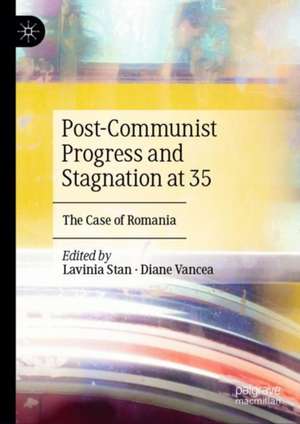Post-Communist Progress and Stagnation at 35: The Case of Romania
Editat de Lavinia Stan, Diane Vanceaen Limba Engleză Hardback – 29 apr 2024
Preț: 785.74 lei
Preț vechi: 958.21 lei
-18% Nou
Puncte Express: 1179
Preț estimativ în valută:
150.40€ • 163.42$ • 126.42£
150.40€ • 163.42$ • 126.42£
Carte tipărită la comandă
Livrare economică 21 aprilie-05 mai
Preluare comenzi: 021 569.72.76
Specificații
ISBN-13: 9783031557491
ISBN-10: 3031557492
Ilustrații: XXVII, 304 p. 9 illus., 7 illus. in color.
Dimensiuni: 148 x 210 mm
Greutate: 0.55 kg
Ediția:2024
Editura: Springer Nature Switzerland
Colecția Palgrave Macmillan
Locul publicării:Cham, Switzerland
ISBN-10: 3031557492
Ilustrații: XXVII, 304 p. 9 illus., 7 illus. in color.
Dimensiuni: 148 x 210 mm
Greutate: 0.55 kg
Ediția:2024
Editura: Springer Nature Switzerland
Colecția Palgrave Macmillan
Locul publicării:Cham, Switzerland
Cuprins
Foreword: Vladimir Tismaneanu.- Chapter 1: Introduction – Dennis Deletant.- Part I: Institutions and Elites.- Chapter 2: Institutional Choices and Weaknesses after 1989 – Florin Anghel.- Chapter 3: An Overview of Cabinet Demographics -- Alexandra Horobet, Claudia Ogrean, Dana Alexandru and Robert Oprescu.- Chapter 4: The Eroding Force of Informal Rules: Romania between Democracy and Europeanisation -- Clara Volintiru and Edit Zgut-Przybylska.- Chapter 5: Are We There Yet? Romania’s Semi-Peripheral Rule of Law -- Mihaela Şerban.- Chapter 6: Protracted Transition: The Civilian Control over the Military and Intelligence -- Marius Ghincea and Marian Zulean.- Part II: Civil Society and Its Values Chapter 7: Romanian Parties and Post-Communist Democracy -- Sorina Soare and Mattia Collini.- Chapter 8: The Challenges of Political Protest and Democratic Representation -- Radu Cinpoes.- Chapter 9: Political Anachronism and Elite Political Culture: The Lacunae Theory - Delia Popescu.- Part III: Change and Continuity in Areas of Life.- Chapter 10: Riding the Waves of Democratization: The Interminable Sea Sickness of Romania's Media -- Peter Gross.- Chapter 11: Change and Continuity in the Higher Education System -- Razvan Zaharia, Rodica Milena Zaharia and Tudor Edu.- Chapter 12: Health and Citizenship in Post-Socialist Romania -- Gerard Weber and Sabina Stan.- Chapter 13: Wild Capitalism with Political Clout -- Lavinia Stan and Diane Vancea.- Part IV: Conclusion.- Chapter 14: Conclusion – Tom Gallagher
Notă biografică
Lavinia Stan is Professor of Political Science and Director of the Center for Post-Communist Studies at St. Francis Xavier University, Canada.
Diane Vancea is Professor of Economics and International Affairs and President of the Senate of the University “Ovidius” in Constanta, Romania.
Diane Vancea is Professor of Economics and International Affairs and President of the Senate of the University “Ovidius” in Constanta, Romania.
Textul de pe ultima copertă
“For anyone interested in contemporary Romania, the publication of Post-Communist Progress and Stagnation at 35, is an exciting event. Ably edited by distinguished Professors Lavinia Stan and Diane Vancea, this volume brings together sophisticated analyses by some of the most clear-sighted specialists to argue that Romania’s post-communist transformation has failed to achieve even an approximation of a liberal democracy or to create conditions in which the mainstream media, the educational system, or the economy itself can operate free of corruption and abuse.”
--Sabrina P. Ramet, author of East Central Europe and Communism: Politics, Culture, and Society, 1943-1991 (Routledge, 2023)
This book examines Romania’s efforts to consolidate liberal democracy and market economy, as desired by the generation who effected change in 1989 and required by the European Union. The ousting of Nicolae Ceausescu, leader of an autarchic and nationalistic dictatorship, underscored the limitations of politically engineering change when rule of law is weak, institutions are misused, and intolerance and cheating are prevalent. Despite initial hopes, Romania’s transition combined progress and stagnation, missed opportunities, detours, unintended consequences, and success. The contributions illustrate the tenuous relationship between continuity and change in a country that is yet to catch up with its neighbors.
Lavinia Stan is Professor of Political Science and Director of the Center for Post-Communist Studies at St. Francis Xavier University, Canada.
Diane Vancea is Professor of Economics and International Affairs and President of the Senate of the University “Ovidius” in Constanta, Romania.
This book examines Romania’s efforts to consolidate liberal democracy and market economy, as desired by the generation who effected change in 1989 and required by the European Union. The ousting of Nicolae Ceausescu, leader of an autarchic and nationalistic dictatorship, underscored the limitations of politically engineering change when rule of law is weak, institutions are misused, and intolerance and cheating are prevalent. Despite initial hopes, Romania’s transition combined progress and stagnation, missed opportunities, detours, unintended consequences, and success. The contributions illustrate the tenuous relationship between continuity and change in a country that is yet to catch up with its neighbors.
Lavinia Stan is Professor of Political Science and Director of the Center for Post-Communist Studies at St. Francis Xavier University, Canada.
Diane Vancea is Professor of Economics and International Affairs and President of the Senate of the University “Ovidius” in Constanta, Romania.
Caracteristici
This book examines Romania’s efforts to consolidate liberal democracy and market economy It achieves this objective by evaluating progress and stagnation, missed opportunities, detours and success This volume gathers contributions that investigate the role of institutions, elites, and civil society values
